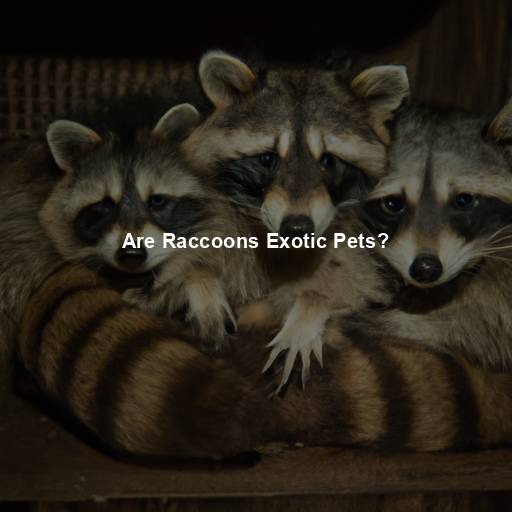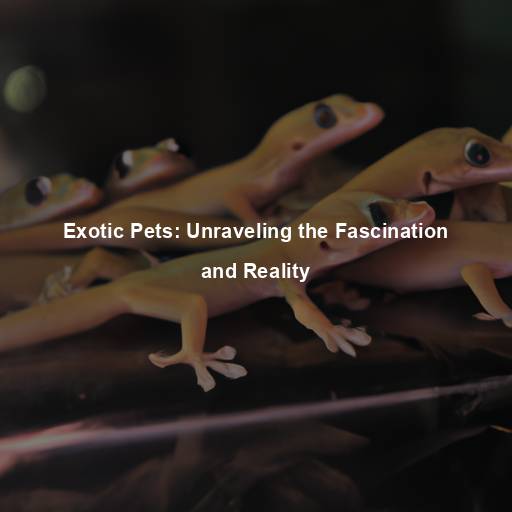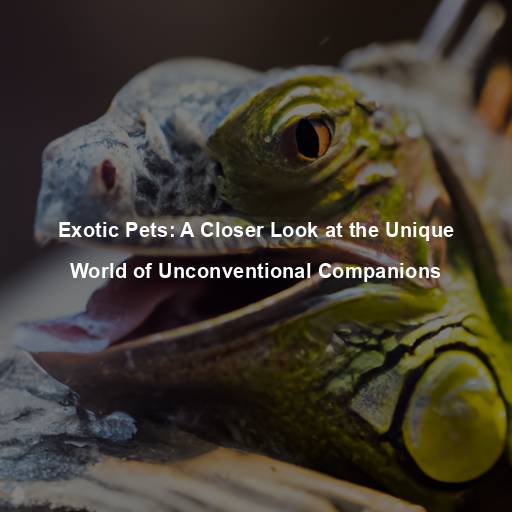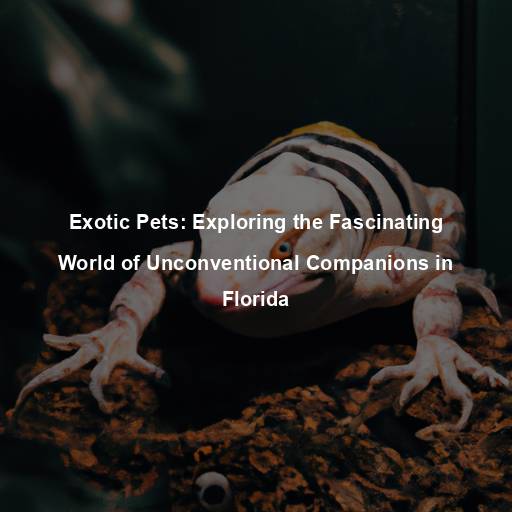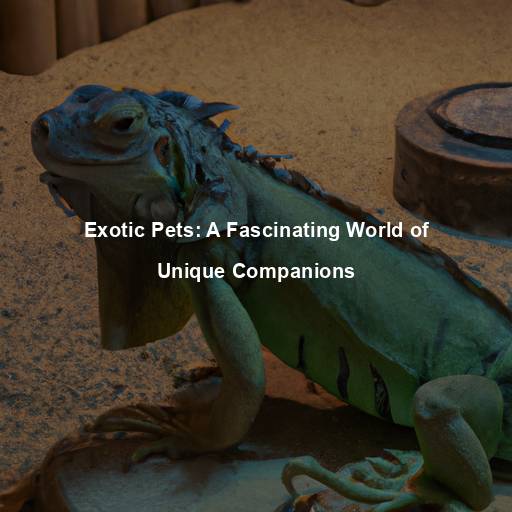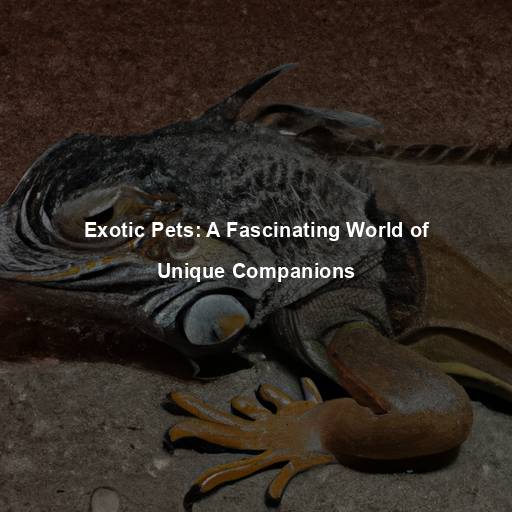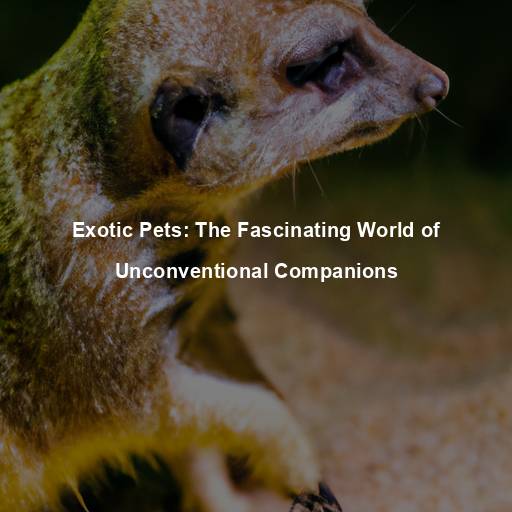Are Raccoons Exotic Pets?
Last Updated on July 22, 2023 by Evan
Contents
- 1 Unveiling the Fascinating World of Raccoons as Potential Pets
- 1.1 Understanding Raccoon Behavior: The Wild Side of Our Furry Friends
- 1.2 Legal Considerations: Navigating the Legality Maze
- 1.3 Health and Safety Concerns: The Hidden Risks of Raccoon Ownership
- 1.4 Ethical Dilemmas: Balancing Captivity and Animal Welfare
- 1.5 Alternatives to Ownership: Supporting Raccoons in the Wild
- 1.6 Pros of Raccoon Ownership: Unique Qualities and Bonding Opportunities
- 1.7 Cons of Raccoon Ownership: Challenges and Considerations
- 1.8 The Importance of Responsible Ownership: Education and Preparation
- 1.9 Myth 1: Raccoons can be easily domesticated like traditional pets.
- 1.10 Myth 2: Raccoons are low-maintenance pets.
- 1.11 Myth 3: Raccoons can be potty-trained like cats or dogs.
- 1.12 Myth 4: Raccoons are suitable pets for families with young children.
- 1.13 Myth 5: Raccoons can be released back into the wild if ownership becomes challenging.
- 2 Expert Opinions: Insights from Wildlife and Exotic Animal Professionals
- 3 FAQs – Are Raccoons Exotic Pets?
Unveiling the Fascinating World of Raccoons as Potential Pets
Raccoons have long captured our imaginations with their charmingly mischievous nature and distinctive mask-like facial markings. With their intelligent and adaptable nature, it’s no wonder some individuals are drawn to the idea of keeping raccoons as pets. However, the question remains: are raccoons truly suitable as exotic pets? In this article, we will delve into the intricacies of raccoon ownership, exploring their natural behavior, legal considerations, and the ethical dimensions surrounding their captivity.
Understanding Raccoon Behavior: The Wild Side of Our Furry Friends
Before considering raccoons as pets, it is crucial to understand their innate behavior and their role in the wild. Raccoons are highly intelligent and resourceful animals, known for their curious and problem-solving nature. They possess sharp claws and teeth, which they employ for hunting, climbing, and manipulating objects. Raccoons are primarily nocturnal creatures, displaying a strong proclivity for exploring their surroundings under the cover of darkness.
In the wild, raccoons are opportunistic omnivores, consuming a diverse diet that includes fruits, nuts, insects, small mammals, and even bird eggs. Their foraging abilities are impressive, and they are skilled at raiding trash cans and other food sources. Their natural inclination for scavenging can present challenges in a domestic setting, as they may exhibit destructive behavior when seeking food or exploring their environment.
The rules surrounding raccoon ownership can be quite perplexing, as they vary greatly depending on where you live. While some regions have a strict ban on keeping these furry creatures as pets, others may allow it but with certain permits or licenses. It’s crucial to delve deep into the local laws and regulations concerning raccoon ownership before even thinking about bringing one into your home. Non-compliance with these legal requirements could result in hefty fines, the loss of your beloved pet, or worst, facing the wrath of the legal system.
When it comes to raccoons, things can get a bit tricky. You see, these creatures are not your typical run-of-the-mill pets. They fall under a whole different category – wildlife or exotic animals, if you will. This means that they are subject to a complex web of regulations, put in place to safeguard both their well-being and the delicate ecosystems they inhabit.
Health and Safety Concerns: The Hidden Risks of Raccoon Ownership
While raccoons may seem adorable and playful, it is essential to recognize that they are ultimately wild animals with specific health and safety considerations. Raccoons are known carriers of various diseases, including rabies, which poses significant risks to both humans and other pets. Additionally, raccoons can transmit parasites such as roundworms, which can cause severe health issues.
Proper handling, hygiene, and regular veterinary care are essential when considering raccoon ownership. However, it is important to note that even with the best intentions and precautions, domesticating raccoons does not eliminate the inherent risks associated with their wild nature.
Ethical Dilemmas: Balancing Captivity and Animal Welfare
When it comes to the hot topic of keeping raccoons as pets, there’s more than meets the eye. While legalities and health concerns are no doubt significant, the ethical dilemma surrounding this furry matter is what truly leaves us scratching our heads. Raccoons, known for their remarkable intelligence and sociability, are creatures that delight in the vast wonders of their natural habitats, embracing intricate behaviors and engaging in captivating social interactions. However, confining them to captivity can easily stifle their innate instincts and limit their freedom to be their authentic, wild selves.
When pondering the potential suitability of raccoons as pets, one cannot overlook the crucial matter of their welfare. Delving into the realm of domesticating these wild creatures inevitably invites a convoluted web of perplexities. The toll it takes on their mental state, inducing distress and unleashing unruly behavior, warrants significant concern and vigilance. As conscientious animal aficionados, it is incumbent upon us to place the utmost importance on the overall happiness and fulfillment of these animals, respecting their innate inclinations and providing an environment that aligns with their intrinsic nature.
Alternatives to Ownership: Supporting Raccoons in the Wild
Why keep raccoons as pets when we can celebrate and protect their uniqueness in other ways? By fostering raccoon-friendly spaces in our neighborhoods, like ensuring they have enough food and safe places to nest, we can coexist harmoniously with these captivating creatures without the need for captivity. Let’s embrace a symbiotic relationship with raccoons, where they thrive and we admire from a distance, avoiding any potential clashes between their wild instincts and our human needs.
One of the most meaningful ways to make a meaningful difference in the lives of raccoons is by championing the efforts of local wildlife rehabilitation centers and conservation organizations. These dedicated organizations go above and beyond to provide a safe haven for injured or orphaned raccoons, tirelessly working towards their ultimate goal of reintroducing them into the wild. By lending our support to these tireless heroes, we can actively contribute to the protection and preservation of these fascinating creatures in their natural habitats.
Pros of Raccoon Ownership: Unique Qualities and Bonding Opportunities
Raccoons possess several qualities that may appeal to individuals seeking unconventional pets. Their intelligence and problem-solving abilities make them highly trainable, and some owners have reported teaching their raccoons tricks and commands. Additionally, raccoons have a playful nature, which can lead to entertaining interactions and moments of joy.
For those seeking a strong bond with their pet, raccoons have the potential to form deep connections with their human companions. With proper socialization from an early age, raccoons can become affectionate and exhibit loyalty towards their owners. These unique qualities can create a special and rewarding relationship between humans and raccoons.
Cons of Raccoon Ownership: Challenges and Considerations
While there are potential benefits to raccoon ownership, it is essential to acknowledge the challenges and considerations that come with it.
Navigating the realm of raccoon ownership can be a perplexing journey due to the myriad of legal restrictions and permits involved. It’s important to note that these laws vary by location, adding a layer of burstiness to the process. Obtaining the necessary permits and licenses can prove to be a complex and time-consuming task, requiring meticulous attention to detail to avoid any legal snags and put the raccoon’s well-being at the forefront of our endeavors.
-
High Maintenance Requirements: Raccoons have specific care needs that are different from traditional pets. They require a spacious and secure enclosure, as well as mental and physical stimulation to prevent boredom and destructive behavior. Additionally, their diet must be carefully managed to ensure proper nutrition and prevent obesity or malnourishment.
-
Zoonotic Diseases and Parasites: Raccoons are known carriers of several zoonotic diseases, including rabies. Close contact with a raccoon can put both humans and other pets at risk of infection. Regular veterinary check-ups, vaccinations, and proper hygiene practices are essential to minimize these risks.
Owning a raccoon is no fleeting endeavor – these curious creatures boast a rather lengthy lifespan compared to other small pets, spanning an impressive 10 to 15 years in captivity. Embarking on this unprecedented journey requires unwavering commitment and an unwavering investment of time, effort, and resources. One must carefully deliberate the long-term ramifications and ascertain whether they can provide the indispensable care required for the raccoon’s entire existence.
The Importance of Responsible Ownership: Education and Preparation
For individuals who are genuinely determined to pursue raccoon ownership, education and preparation are paramount. It is crucial to thoroughly research and gain a comprehensive understanding of raccoon behavior, needs, and care requirements. Connecting with experienced raccoon owners or experts in the field can provide valuable insights and guidance.
Thinking about adding a raccoon to your household? Take a moment to ponder these important factors:
Enclosure and Enrichment:
When it comes to accommodating our furry friends, raccoons, we cannot underestimate the significance of providing them with suitable housing. It is crucial to offer them a generous and secure enclosure that caters to their innate needs of climbing, exploring, and indulging in their natural behaviors. In addition to that, we mustn’t overlook the importance of keeping their minds engaged and boredom at bay by incorporating environmental enrichment tools, such as thought-provoking puzzle toys and strategic hiding spots. By bestowing upon our raccoon companions these essential provisions, we can ensure their overall well-being amidst the perplexities of their wild demeanor.
Proper Diet and Nutrition:
Raccoons have specific dietary needs that must be met to ensure their overall health and well-being. Consult with a veterinarian or a raccoon specialist to create a balanced and appropriate diet plan. Avoid feeding them a diet primarily consisting of processed human food, as it can lead to nutritional deficiencies and health issues.
Veterinary Care and Health Monitoring:
Keeping your raccoon in good health should be a top priority, and that includes regular trips to the vet. These check-ups are not just about ensuring your furry friend is in tip-top shape, but also about catching any potential health concerns before they spiral out of control. From vaccinations to preemptive parasite prevention, your raccoon’s healthcare routine needs to cover all the bases. It’s crucial to find a vet who is knowledgeable about caring for exotic animals and can build a strong bond with your raccoon to ensure their well-being.
Socialization and Training:
Early socialization is vital for raccoons to adapt well to their human environment. Positive reinforcement training methods can be used to teach them basic commands and establish boundaries. It is crucial to remember that raccoons have their own unique instincts and behaviors, and training should always prioritize their welfare and natural inclinations.
Myth 1: Raccoons can be easily domesticated like traditional pets.
Many people assume that raccoons can be easily tamed, but the reality is quite different. Despite the occasional display of affection, it’s crucial to recognize that these creatures are still deeply rooted in their wild instincts. Trying to transform them into truly domesticated pets can quickly become a rollercoaster of puzzlement and disillusionment, leaving both humans and raccoons bewildered. It’s essential to respect their innate nature and avoid the inevitable letdown that could follow any misguided attempts at domestication.
Myth 2: Raccoons are low-maintenance pets.
Taking care of raccoons can be quite a demanding task, as they have unique requirements that must be met. From their specialized diets to their need for ample space and mental stimulation, these furry creatures require constant attention and care. Regular visits to the vet are essential to ensure their health and wellbeing. Owning a raccoon is no ordinary pet ownership, but rather a commitment that comes with a level of responsibility that should not be underestimated.
Myth 3: Raccoons can be potty-trained like cats or dogs.
When it comes to potty-training raccoons, it’s like navigating a maze of unpredictability. While these clever critters can grasp the concept of using a litter box to a certain degree, don’t be perplexed if accidents become part of the equation. Their instinctual behaviors and occasional marking tendencies can play a disruptive role in achieving full potty-training success. It’s crucial to brace yourself for potential cleanup missions and offer consistent training and guidance on the raccoon’s journey towards bathroom etiquette.
Myth 4: Raccoons are suitable pets for families with young children.
When it comes to inviting unconventional guests into our homes, raccoons certainly raise some eyebrows. Their untamed spirit, adorned with their razor-sharp claws and teeth, might not align well with families harboring little kids. These mischievous creatures, known for their playfulness and inquisitiveness, may accidentally inflict scratches or bites that could jeopardize the safety of both the little ones and the raccoons themselves. Safeguarding the well-being of every family member should remain the paramount consideration if the idea of raccoon companionship ever tickles your fancy.
Myth 5: Raccoons can be released back into the wild if ownership becomes challenging.
When a raccoon has spent time in captivity under the care of humans, reintroducing them to the wild may not be as straightforward as it seems. These clever creatures can quickly grow accustomed to the comforts and provisions provided by humans, making it challenging for them to fend for themselves once released. Therefore, it is crucial to carefully contemplate the profound commitment and sense of responsibility required in owning a raccoon before inviting one into the cozy corners of your home.
Expert Opinions: Insights from Wildlife and Exotic Animal Professionals
Perspectives from Wildlife Rehabilitation Centers
Wildlife rehabilitation centers hold unparalleled expertise in the intricate realm of nurturing and reviving wounded or parentless creatures, encompassing the nimble raccoon species. A symphony of knowledge and compassion orchestrates their every endeavor, ensuring the revival of these enigmatic beings to harmoniously coexist within their native environs. These commendable sanctuaries relentlessly pursue the noble goal of cherishing raccoons, nursing them back to robust wellness, and eventually ushering them into the embrace of their untamed homes.
According to wildlife experts, raccoons are best appreciated from a distance. They emphasize the importance of supporting conservation efforts and creating wildlife-friendly environments that allow raccoons to thrive in their natural habitats. By providing safe food sources, preserving natural ecosystems, and minimizing human-wildlife conflicts, we can contribute to the well-being of raccoons in a more ethical and sustainable manner.
Insights from Exotic Animal Veterinarians
Exotic animal veterinarians play a crucial role in providing specialized care for raccoons and other non-traditional pets. They possess in-depth knowledge of the unique health considerations and requirements for these animals.
Keeping raccoons as pets can be a perplexing endeavor, as exotic animal veterinarians frequently caution against it. These experts highlight the burstiness of challenges that arise when attempting to meet the complex needs of these creatures. From creating a suitable environment to ensuring proper nutrition, the responsibilities associated with the overall well-being of raccoons can be overwhelming. Ultimately, their wisdom underscores the ethical considerations surrounding the captivity of these fascinating animals, urging us to approach pet ownership with great care.
FAQs – Are Raccoons Exotic Pets?
Can I keep a raccoon as a pet?
Owning a raccoon as a pet may sound tempting, with their undeniable cuteness and mysterious allure. However, it is important to consider the perplexities and uncertainties that come with such a decision. Raccoons are untamed creatures, deeply rooted in their wild instincts, which may present a burst of challenges when attempting to domesticate them. Moreover, it is essential to remember that regulations and laws in various regions can bring about a flurry of restrictions, rendering the idea of having a raccoon as a pet unfeasible or even forbidden.
What are the challenges of keeping a raccoon as a pet?
Having a raccoon as your furry companion may seem appealing, but let’s not ignore the burst of challenges that come with it. These magnificent creatures are not your ordinary pets, for they possess an exceptional level of intelligence, energy, and sociability. Providing them with adequate mental and physical stimulation is no walk in the park. These curious critters are prone to wreaking havoc when confined, as their insatiable desire to explore knows no bounds. Plus, managing their natural instincts – like marking territory and hunting for food – within the cozy confines of your home can leave you feeling perplexed. Let’s not forget about the health risks involved, as raccoons are notorious carriers of diseases that can be transmitted to humans. Should you take the plunge and embrace the raccoon life, proceed with caution and be prepared to embark on a bewildering adventure like no other.
Is it legal to own a raccoon as a pet?
Owning a raccoon as a pet can be a perplexing legal maze, as regulations differ from place to place. Bursting with curiosity, one must navigate the labyrinthine world of permits and licenses to ensure compliance. While some regions allow raccoon ownership, there are often peculiar requirements and intricate regulations to abide by. It is paramount to conduct thorough research and follow the legal landscape of your specific locale before contemplating the idea of having a raccoon as a pet. Unraveling the web of illegality can lead to penalties and pose a threat to the welfare of these intriguing creatures.
Are there any alternatives to owning a raccoon as a pet?
Instead of keeping a raccoon as a pet, it is recommended to explore alternative ways to appreciate and observe these fascinating creatures. Visiting wildlife reserves, parks, or zoos allows you to observe raccoons in their natural habitat while also promoting conservation efforts. There may also be local organizations or rehabilitation centers dedicated to helping injured or orphaned raccoons where you can volunteer or support their work.
What should I do if I find a baby raccoon or injured adult raccoon?
When encountering a baby raccoon in need or an injured adult raccoon, it’s vital to reach out to local wildlife rehabilitators or animal control authorities. These experienced individuals possess the expertise and resources required to offer the appropriate care and support these creatures deserve. Taking matters into your own hands, without the necessary know-how and facilities, could have adverse effects on their well-being and potentially even lead to legal consequences. By seeking professional assistance, you’re not only ensuring the raccoon’s welfare but also increasing their chances of survival to the fullest extent.

